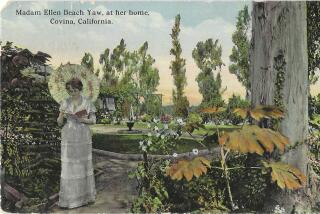Jean Hay, 87; Host of Radio’s ‘Reveille With Beverly’ Gave GIs Their Wake-Up Call
- Share via
Jean Ruth Hay, who was better known to millions of GIs during World War II as the effervescent host of the radio wake-up program “Reveille With Beverly,” has died. She was 87.
Hay, a longtime Montecito resident who moved to Fortuna, Calif., about five years ago, died Sept. 18 in a hospital after suffering a stroke while gardening, her family said.
As Beverly, Hay was the welcome alternative to the 5:30 a.m. bugle blast that propelled servicemen out of bed in military outposts around the world during the war.
Sitting in a small soundproof booth at radio station KNX-AM in Hollywood, Hay addressed her GI listeners in a warm, friendly voice.
“Hi there, boys of the U.S.A.,” she would say. “We’re ready with the stuff that makes you swing and sway!”
An unscripted show, “Reveille With Beverly” featured Hay reading highlights from GIs’ letters and playing the 78s they requested -- the best from big-band greats such as Glenn Miller, Harry James and Woody Herman.
Or, as Hay would say in her breezy, slangy style: “The turntables are loaded and they’re bustin’ with bounce....”
A rarity as a woman disc jockey, Hay brought a touch of home to the nation’s far-flung servicemen.
“There was an intimacy before dawn as the microphone took my voice directly into their barracks,” she said on her website. “My music smoothed the way, softened the fears and developed camaraderie among young men.”
Hay, born in Philadelphia, was a 24-year-old University of Colorado graduate in 1941 when she heard peacetime draftees at Ft. Logan complain about “the bugler’s blast at 0530 that hurtled them out of their cots in a terrible mood.”
“I thought about the trumpet player on the Benny Goodman record of ‘Bugle Call Rag,’ ” Hay said on her website. “He opened with an upbeat, but softer version of the reveille call to rise and shine. Could we somehow broadcast that into the barracks? And if so, why not play out the entire record? Let the guys police their barracks to the beat of the band of the king of swing. My dream then added jazz, blues and ballads at dawn.”
And, she wondered, why not have her as the disc jockey?
She took her idea to the manager of Denver radio station KFEL-AM, who agreed to let her go on the air at 5:30 a.m. six days a week. On her way to the audition, she chose the on-air name Beverly because it “almost rhymed with reveille.”
“Reveille With Beverly,” which premiered on KFEL on Oct. 20, 1941, was an immediate hit and generated unexpected publicity for the attractive Hay, who was described in the local press as “Miss of the Mike” and “Buck Private Beverly.”
In January 1942, a month after the attack on Pearl Harbor, the radio column in Time magazine featured a picture of Hay at the KFEL microphone and a story headlined “Dawn’s Early Light.”
Describing her as “a cheerful, blue-eyed little number,” the story said that she was “directly responsible for the fact that 28,000 Army men at Ft. Logan and three other Army posts [in Colorado] get up willingly before sunrise.” One solider was quoted as saying, “She has a sense of humor as sharp as jailhouse coffee.”
A month later, Life magazine featured Hay in a photo spread on “Army Sweethearts.” As a result of the national exposure, Columbia Pictures bought the film rights to “Reveille With Beverly,” and KNX, a 50,000-watt CBS affiliate, asked her to transfer her hourlong show to Hollywood.
“Reveille With Beverly” was soon transmitted around the world via Armed Forces Radio Services, which also offered her a job boosting GIs’ morale as the host of a shorter, copycat program, “GI Jive,” for AFRS.
In time, the programs were being broadcast to GIs in 54 countries and were reaching a potential audience of 11 million, making her the world’s first global disc jockey.
“She was kind of the grandmother of modern radio,” Dean Opperman, a friend of Hay, told The Times on Thursday.
“I’d call her the first female disc jockey of any note,” he said. “For somebody to come along as we know it today -- to play records and take requests and read fan mail -- Jean invented that.”
Hay also interviewed many of the era’s musical greats on her two shows, Opperman said. “Los Angeles had a hot jazz scene on Central Avenue, so she interviewed a lot of the black stars too. Nobody was doing what she was doing.”
Opperman described Hays’ on-air personality as “effervescent, positive, sexy, witty, uplifting.” And off the air, he said, “she was all those things.”
Columbia’s “Reveille With Beverly,” a B-movie musical starring Ann Miller and featuring Duke Ellington, Count Basie, Bob Crosby, Frank Sinatra and the Mills Bros., was released in 1943.
Although Hay was offered a screen test, she turned it down. “I was no actress,” she told The Times in a 2001 interview. But she did make $1,200 serving as technical advisor on the film.
As such, Hay insisted that the orchestras be on camera for their entire numbers instead of the usual practice of being heard only briefly while the movie returned to the plot -- a revolutionary approach that Ellington praised as “a milestone in musical movies.” Hay also insisted that Sinatra, her favorite “boy singer” from the Tommy Dorsey orchestra, be in the film.
As radio’s Beverly, Hay received star treatment. She was asked to pose for pinup shots, which she autographed and sent to listeners; some of the shots wound up as “nose art” on military aircraft.
Hay also made personal appearances at bases and received as much mail as any Hollywood star. Her GI listeners also expressed their admiration by crowning her Queen of the Pomona Ordnance Base and voting her “The Girl We’d Most Like to Be Trapped in the Turret of a B-17 With.”
In 1945, she married bandleader Freddie Slack, who appeared in “Reveille With Beverly”; they divorced three years later.
She moved to Santa Barbara in 1949 and hosted an early morning music show on radio station KIST-AM until 1953. From 1953 through 1956, she hosted “Beverly on 3,” a half-hour live television show featuring music and interviews on Santa Barbara station KEYT-TV.
In the 1960s, she was a television commercial spokeswoman for such companies as Wonder Bread, Carnation Milk and Pillsbury.
Hay devoted much of her postwar life to Santa Barbara-based Direct Relief International, for which she served as chairman and board member.
She is survived by her husband of 52 years, John, a retired attorney; three children, Barry, Bob and Diana Simpson; and a grandson.
More to Read
The complete guide to home viewing
Get Screen Gab for everything about the TV shows and streaming movies everyone’s talking about.
You may occasionally receive promotional content from the Los Angeles Times.






